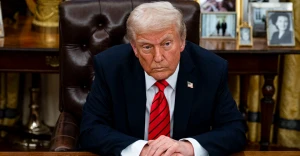
Investigation reveals Google’s collaboration with autocratic regimes, including the Kremlin
An investigation by The Observer revealed that, since 2011, Google has collaborated with the administrations of approximately 150 countries, including autocratic regimes like the Kremlin in Russia and the Communist Party of China, that seek to censor information
The Guardian reported this. The article for The Observer, authored by Siân Boyle, says that in addition to democratic governments, Google has interacted with dictatorships, sanctioned regimes, and governments accused of human rights violations.
In response to requests from the Russian and Chinese governments, the company has removed content such as YouTube videos of anti-government protesters or material criticizing and exposing corruption among politicians in these countries.
Google’s own data shows that there are 5.6 million content items worldwide that it has "named for removal" following government requests. According to cybersecurity firm Surfshark, the number of content removal requests to Google has more than doubled since 2020.
The company regularly receives requests for content removal from national and local governments around the world, as well as from judicial, police, and military authorities. Google does not publish full data on removal requests but compiles summaries of certain censorship requests that it believes "may be of public interest." These summaries are included in the company's Transparency Report, which is updated every six months, according to the investigators.
Analysis of this report has revealed an opaque process of data removal. "It raises questions about Google’s role in controlling public information, and in areas such as disinformation, war propaganda and geopolitics," Siân Boyle, the author of the report, noted.
The Observer analyzed data on content removal by specific countries, types of requests, who submitted them, and the time periods during which they were made. Since 2020, most global content removal requests to Google have been related to copyright issues, as well as privacy and security concerns. Thousands of requests are categorized as "other" without further explanation.
Between 2020 and June 2024, Russia accounted for more than 60% of removal requests. Roskomnadzor, Russia's internet censor, is one of the government agencies that most frequently communicates with Google, according to the investigators.
Under Roskomnadzor’s direction, the tech company removed YouTube videos exposing "corruption among politicians" and containing "some rhetorical threats of violent action against the alleged corrupt politicians," according to Google’s report.
Russian citizens were also blocked from viewing certain posts on Google’s Blogger platform, which "included criticism of Russian military history and policy, and Russian patriotic holidays. It also incited violence against residents of a Russian town," the report states.
Footage of Ukrainian protesters burning the Russian flag and destroying Russian state symbols was also removed from YouTube.
In 2022, Google censored several YouTube videos calling for protests against Vladimir Putin’s government. Other content criticizing Putin, including recommendations from the late Russian opposition leader Alexei Navalny regarding tactical voting, was temporarily blocked during the September 2021 elections. Roskomnadzor and other Russian state agencies also requested that Google remove Navalny’s Smart Voting app from its Play Store, which was done.
Google has also assisted China in suppressing freedom of speech. The company has cooperated with the Afghan police and received requests from the governments of Iran and the United States.
- Serhiy Fursa, an investment banker, believes that in the near future no sanctions will be able to significantly affect the Russian economy.
- News












































